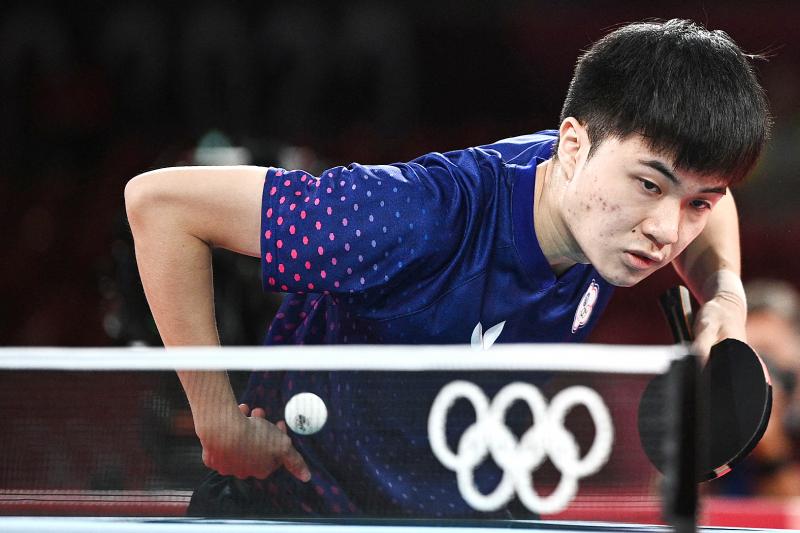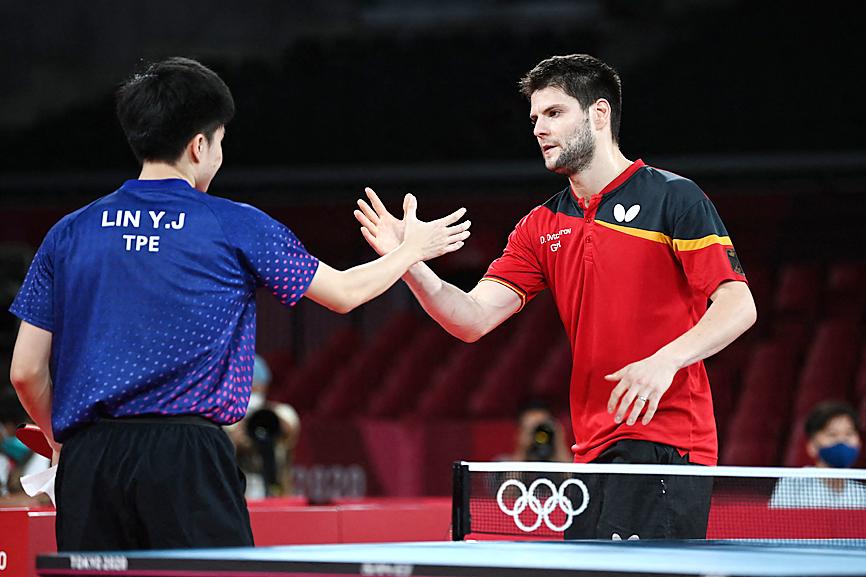Taiwan’s Lin Yun-ju (林昀儒) yesterday failed in his bid to claim a bronze medal at the Olympic Games in Tokyo, as the 19-year-old rising star lost a nail-biting men’s singles bronze medal match 4-3 to Germany’s Dimitrij Ovtcharov.
It was history repeating itself, after Ovtcharov once again denied Taiwan its first ever Olympic table tennis medal in men’s singles.
The teenage table tennis sensation had his chances in the best-of-seven bronze medal match, garnering four match points in a dramatic sixth game, but the Kiev-born German saved all of them and blunted another rally in the final game for a 13-11, 9-11, 6-11, 11-4, 4-11, 15-13, 11-7 triumph in 66 minutes.

Photo: AFP
Taiwan’s previous best finish in Olympic men’s singles had been nine years earlier in London, when Chuang Chih-yuan (莊智淵) lost a six-game heartbreaker in the bronze medal match to Ovtcharov, 14-12 in the final game.
Lin had a better chance to break the dry spell, but he lamented his inability to convert any of his four match points.
“I didn’t feel especially nervous, but I know I didn’t play some of those points right,” Lin said.

Photo: AFP
The “Silent Assassin,” as he is known because of his calm under pressure, struggled out of the gate in the final game, falling behind 9-3.
“By that point, the momentum had shifted to my opponent, and all I could do was try to catch up one point at a time,” he said.
He rallied for four straight points to pull within 9-7, but Ovtcharov closed out the match when Lin hit a backhand into the net.
“All I can do now is go home and figure out how to get better,” Lin said.
His coach Chiang Peng-lung (蔣澎龍) said that Lin was outstanding in his first Olympic appearance, in which the world No. 6 teenager nearly defeated world No. 1 Fan Zhendong (樊振東) of China in the semi-finals.
Chiang felt Lin did tighten up in the latter stages of yesterday’s match, because he wanted to win too much, but that would change with experience, he said.
“He has a big opportunity in the future, and will now look toward the 2024 Olympics in Paris,” Chiang said.
Ovtcharov praised Lin for pushing him to the brink. Asked about taking bronze from Taiwan for a second time in nine years, Ovtcharov said that Chuang is a good friend and Lin is a teammate of his at his European club, but in the end, the Olympics are a competition.
He had no doubt that Lin would break through.
“He will definitely win a medal one day,” the German said.
Additional reporting by AFP

A Ministry of Foreign Affairs official yesterday said that a delegation that visited China for an APEC meeting did not receive any kind of treatment that downgraded Taiwan’s sovereignty. Department of International Organizations Director-General Jonathan Sun (孫儉元) said that he and a group of ministry officials visited Shenzhen, China, to attend the APEC Informal Senior Officials’ Meeting last month. The trip went “smoothly and safely” for all Taiwanese delegates, as the Chinese side arranged the trip in accordance with long-standing practices, Sun said at the ministry’s weekly briefing. The Taiwanese group did not encounter any political suppression, he said. Sun made the remarks when

The Taiwanese passport ranked 33rd in a global listing of passports by convenience this month, rising three places from last month’s ranking, but matching its position in January last year. The Henley Passport Index, an international ranking of passports by the number of designations its holder can travel to without a visa, showed that the Taiwan passport enables holders to travel to 139 countries and territories without a visa. Singapore’s passport was ranked the most powerful with visa-free access to 192 destinations out of 227, according to the index published on Tuesday by UK-based migration investment consultancy firm Henley and Partners. Japan’s and

BROAD AGREEMENT: The two are nearing a trade deal to reduce Taiwan’s tariff to 15% and a commitment for TSMC to build five more fabs, a ‘New York Times’ report said Taiwan and the US have reached a broad consensus on a trade deal, the Executive Yuan’s Office of Trade Negotiations said yesterday, after a report said that Washington is set to reduce Taiwan’s tariff rate to 15 percent. The New York Times on Monday reported that the two nations are nearing a trade deal to reduce Taiwan’s tariff rate to 15 percent and commit Taiwan Semiconductor Manufacturing Co (TSMC, 台積電) to building at least five more facilities in the US. “The agreement, which has been under negotiation for months, is being legally scrubbed and could be announced this month,” the paper said,

MIXED SOURCING: While Taiwan is expanding domestic production, it also sources munitions overseas, as some, like M855 rounds, are cheaper than locally made ones Taiwan and the US plan to jointly produce 155mm artillery shells, as the munition is in high demand due to the Ukraine-Russia war and should be useful in Taiwan’s self-defense, Armaments Bureau Director-General Lieutenant General Lin Wen-hsiang (林文祥) told lawmakers in Taipei yesterday. Lin was responding to questions about Taiwan’s partnership with allies in producing munitions at a meeting of the legislature’s Foreign Affairs and National Defense Committee. Given the intense demand for 155mm artillery shells in Ukraine’s defense against the Russian invasion, and in light of Taiwan’s own defensive needs, Taipei and Washington plan to jointly produce 155mm shells, said Lin,